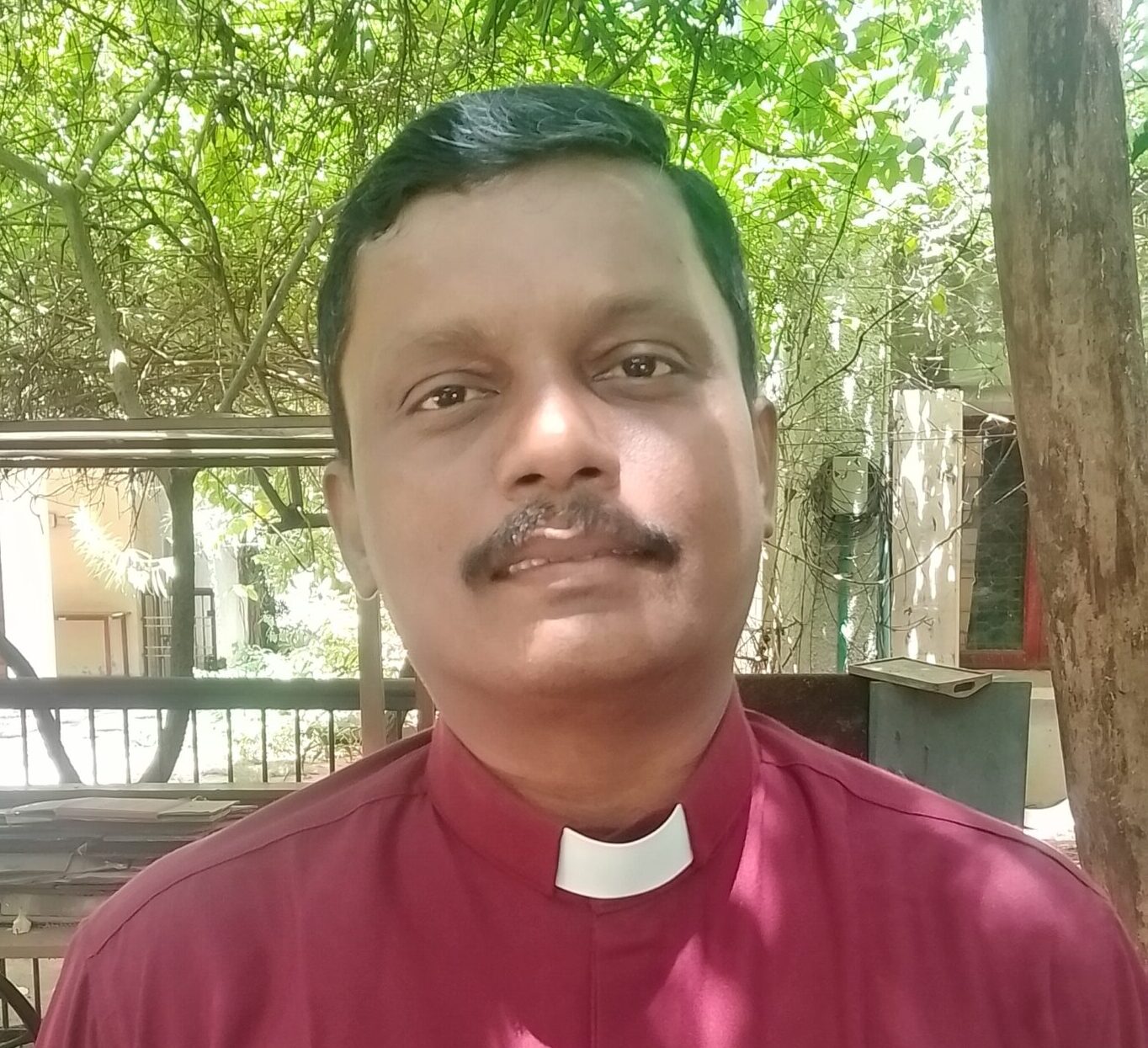In every confirmation service the confirmands and the congregation were asked to place their hands on their heads to recite the verse 1 Corinthians 9:16, “Woe to me if I do not proclaim the Gospel” only after which the Bishop would go ahead in confirming the candidates. This was how Bishop Vedanayagam Samuel Azariah was introduced to me during my childhood days. This created an interest to know more about him. Later I found that he was the first Indian Bishop in the churches of the Anglican Communion. He also played a key role in the formation of the Church of South India, the event considered in the history of Christianity as the “Second Pentecost.” During my first semester course on Ecumenical Movements here in Gurukul, it was astounding for me to know that in the World Missionary Conference 1910 in Edinburgh, Scotland, among the 1200 representatives predominantly from the West, only 17 of them were from the “Global South” and that included Bishop V. S. Azariah from India. He challenged the gathering through his words “Through all the ages to come, the Indian church will rise up in gratitude to attest the heroism and self-denying labours of the missionary body… You have given your goods to feed the poor. You have given your bodies to be burned. We also ask for love. Give us Friends!” Give Us Friends!
Azariah’s call for friends struck a chord with the listeners; which eventually paved a path for a new mission paradigm. For today’s reflection I have entitled the theme as “Symbiotic Friendship: A Mission Paradigm”
Why not just Friendship? Why Symbiotic Friendship? It is not just to include our College theme for the year in the reflection, instead in the world where the true meaning of friendship is getting diluted it is essential to add Symbiotic as an adjective to friendship. Symbiotic Friendship! A friendship that is mutually beneficial.
A Call within a Call
By the way, today the 26th of August is the 114th birthday of Mother Teresa, and today is also the Women’s Equality Day, the day that commemorates the passage of the amendment to the
U.S. Constitution which granted the women’s right to vote. On this day, we thank God for the life of Mother Teresa and the women empowerment initiatives like these taken in the history.
The place Kolkotta where Mother Teresa received “A Call within a Call,” is giving another call that demands justice for the PG medical student who was brutally raped and murdered.
Women empowerment alone is not sufficient, there needs a paradigm shift in the protocols that would ensure the safety and peaceful living of every woman. Our deep condolences to the bereaved family and prayers for God’s justice to be served for the victimized.
V. S. Azariah’s concern would be a logical question
Coming back to the theme. Why to reflect on the words of V. S. Azariah today would be a logical question. It is because the Indian church and probably the Church at large had celebrated his Sesquicentennial birthday (150th) on the 17th August this year. Hence it is fitting to do it at least some time by this month.
For decades and may be for centuries, the missionary enterprise has travelled with paternalism along the lines of “The West Knows Best,” “We Westerners are the only ones who are really committed to reaching the unreached with the Word of God.” It was to these dominantly seasoned people, V. S. Azariah addressed in the gathering at Edinburgh. It would be relatively easy to challenge the Western World with these words today but at his time it was a brave attempt! Otherwise why would it be a speech that we ponder after more than a century? Vineeth Koshy of the National Council of Churches in India once said, “V. S. Azariah had created deep impressions through his challenging speech at the Edinburgh 1910 Conference. His passionate plea for friendship on equal terms and the sharing of responsibility is still very relevant today. What is more important is he had the courage to speak his mind.”
It is interesting to contemplate why V. S. Azariah preferred the word “Friends” amidst various possible words like Partners, Companions etc.? I think probably he would have been convinced by this analogy used by Jesus in John 15:15, where He says, “I do not call you servants any longer… but I have called you friends.”
This verse is part of a larger discourse known as the Farewell Discourse, found in John chapter 13-17. It takes place during the Last Supper, the final meal Jesus shares with His disciples before His crucifixion. This discourse is characterized by intimate teachings in preparing His disciples for His approaching departure.
John 15:15 implies that Jesus would have used to call His disciples as servants. That is why He says, “I do not call you servants any longer…,” which means He would have called them servants before. Jesus had to take a shift of His understanding and approach from subjugation to symbiosis as He related with His disciples. Not as Servants or Slaves any longer but as Friends. If Jesus needed a shift, how much more should it be for us?
Traditionally, in the context of the ancient world, a servant (or slave) had a limited relationship with their master, focused solely on performing duties without any insight into the master’s plans or intentions. That is what it is rightly recorded in verse 15 as “The servant does not know what the master is doing.”
By calling His disciples as friends, Jesus is emphasizing a new level of intimacy and mutual understanding. Unlike servants, friends share in each other’s thoughts and plans. Jesus said, “…I have made known to you everything that I have heard from my Father” by which He indicates a deep level of His revelation and trust.
In the first-century Jewish culture, social hierarchies were rigid, and relationships were often defined by status and roles. The term ‘servant’ reflects a lower social status with limited personal connection to the master. Jesus’ reference to calling His disciples “friends” subverts these social norms, suggesting a radical redefinition of relationships within the community.
We as Christians are often bound with religious limitations in ecclesiastical circles, where we confine ourselves with people of our faith alone. Whereas beyond the walls of Ekklesia, we all have friends of different religions. Don’t we? Doesn’t it prove the barrier-crossing nature of friendship? Tim Chester says, “Friendship is not just a strategy for mission; it is the mission itself. By building genuine relationships, we embody the love of Christ, which transcends cultural and social barriers.” How true it is!
This shift from servitude to friendship reflects a deeper level of discipleship. The disciples are no longer mere followers of a teacher but are brought into a close, personal relationship with Him, where they understand and participate in the divine mission.
Friendship involves freedom!
This transition suggests ethical considerations as well. Being a Servant invites obligation to the Master where as being a friend is a free will. As per the words of Joseph Prabhakar Dhayam in his reflection on our a Sunday community worship couple of weeks back in Gurukul Lutheran Theological College, Chennai,
A friend has freedom to continue in friendship or to walk away. Friendship involves freedom!
Friendship in mission infers a relationship of mutual encouragement and support. We work together, lift each other up, and share in one another’s joys and struggles. David Bosch said, “In the context of mission, friendship serves as the bridge over which the Gospel can travel. It is the means by which trust is established and the message of Christ is conveyed with integrity and love.”
Friendship is so deep for Jesus Himself as He mentions in John 15:13, “No one has greater love than this, to lay down one’s life for one’s friends.” This implies His death on the Cross was for His friendship with the humanity and the cosmos at large. Ideally and in praxis, friendship is the only visible community of equals.
Today the Church is in the process of rethinking a mission paradigm of Symbiotic Friendship, where it is called to transcend from subjugation to synergy, from enmity to embrace, from being authoritative to abiding, from being followers to companions of Christ, all of these are the characteristics of a Symbiotic Friendship.
Jesus’ call to be friends in mission extends to all corners of our lives. It challenges us to reach out to our communities, engage with the marginalized, and embody the love and grace of Christ in every interaction.
As we call ourselves a Community in Mission, let us not overlook the words of Christopher
J. H. Wright, “True Mission Work is impossible without Friendship.” As a theological community let us be challenged by these words of Jesus and V. S. Azariah to envision and exercise Symbiotic Friendship in all walks of life in all possible ways. As we go forth into this world on missions, let us remember that our mission is rooted in the friendship we share with Jesus and with each other. It is driven by the same love that transformed the disciples’ understanding and equipped them to be the agents of change in the world. May I conclude with the words of Lesslie Newbigin, “Friendship in Mission is about more than simply working together; it is about sharing life in such a way that Christ is made visible to this world in our relationships.”
May God help us to internalize and induce this Symbiotic Friendship in all our mission endeavors. Amen.

Rev. David Dhinakaran
CSI Madras Diocese.
About David Dhinakaran
Rev. David Dhinakaran is a dedicated theologian and presbyter affiliated with the CSI Madras Diocese. Currently, he is advancing his theological education by pursuing a Master of Theology in Missiology at Gurukul Lutheran Theological College & Research Institute in Chennai. His academic journey is complemented by his previous studies at Tamilnadu Theological Seminary, where he laid the foundation for his deep commitment to Christian ministry and mission. Rev. Dhinakaran’s work reflects a profound dedication to both theological scholarship and practical ministry, aiming to enrich his contributions to the church and the broader community through his specialized studies in missiology.

Esuiyakkam to be the light for the people of god